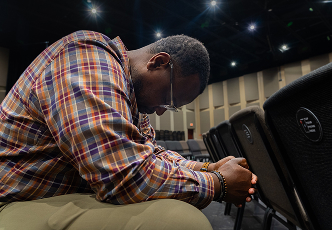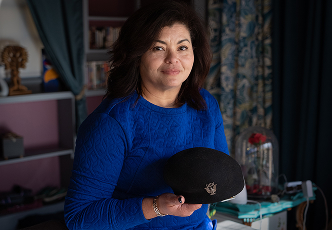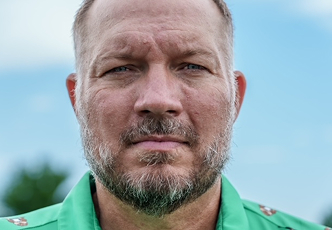Moral Injury and PTSD
As a Veteran, you might have experienced stressful and traumatic events that violated your deeply held morals or values. These events can lead to posttraumatic stress disorder (PTSD), moral injury, and in some cases, both. Here you can learn from Veterans who experienced both PTSD and moral injury.
What is moral injury?
Moral injury is not a diagnosis, but it often occurs together with PTSD and other mental health conditions that are common after trauma. Moral injury describes the distressing psychological, behavioral, social, and sometimes spiritual effects of witnessing or taking part in an event that goes against people’s deeply held moral and spiritual beliefs and values.
Serving in the military, especially during wartime, can raise the chance of being exposed to an event that may cause moral injury, although these kinds of events can happen in civilian life too. Many Veterans who have experienced moral injury struggle with intense feelings of guilt, shame, and self-hatred, even long after the event has passed. They may feel like what they did — or what they didn’t do — makes them a bad person, even if they didn’t have a choice or they were acting on orders. This sense of guilt and shame can cause Veterans to think that they don’t deserve to be happy, or to have good things in life.
Veterans might experience moral injury after:
- Taking part in military actions where civilians were injured or killed, especially older adults, women, or children
- Witnessing a fellow service member being injured or killed — and being unable to prevent it
- Being unable to help others who are suffering
- Witnessing others’ immoral actions, like fellow service members using excessive violence in combat or harming civilians
- Feeling some responsibility for harm caused by an institution of which you were or are a part
Moral injury is something that you did, failed to do, or witnessed that went against your morals and values. You crossed a line somehow, and as a result, you have symptoms including guilt, shame, self-hatred, withdrawal, and the inability to self-forgive.”
Dr. Shira Maguen, Clinical Psychologist, explains how moral injury affects Veterans.
I knew that I didn’t feel well in Afghanistan. Once I returned to the United States and was seeking help, I was able to identify that disconnect between having been over there, seeing and witnessing people that were injured, and knowing that I couldn’t assist them. It was a disconnect between my internal core values and the expectations placed on me within service.”
Dr. Irene Zoesch (US Army, 2014-2018) describes how she began to recognize that she had experienced moral injury.
I didn’t think I deserved to be happy because of the misfortunes of others based on me. And so that gave me guilt. And when I felt guilty, I didn’t think I was deserving of anything good to take place in my life.”
Michael Hardiman (US Army, 1970-1974) shares how guilt affected his sense of self-worth.
How are moral injury and PTSD related?
PTSD and moral injury aren’t the same, but they often occur together and share some features. Both PTSD and moral injury often start with a traumatic event, and both cause people to feel distress long after the event has passed. PTSD and moral injury also share some common features, like feelings of guilt and shame and losing trust in others.
There are also differences. Symptoms of PTSD, like constantly feeling on high alert or startling easily, aren’t as common in people who experienced moral injury. Feeling like one doesn’t deserve to be happy or deserves to be punished for their actions or inactions may be more unique to moral injury.
When a Veteran has both PTSD and moral injury, these conditions may be caused by the same event or by different events — and symptoms overall may be more severe.
I do believe that moral injury runs deeper than PTSD when it ties to your identity. I grew up in a Christian household. I grew up in a household where right is right, wrong is wrong. In a war scenario, you really find yourself going against all of these things that you grew up understanding and believing.”
Michael Allison (US Marines, 1999-2007) shares his perspective on the difference between moral injury and PTSD.
How do I know if I may have moral injury?
Ask yourself if some or all of these statements feel true for you:
- I’ve experienced situations where I acted in ways that went against my deeply held beliefs and values.
- I violated my own morals or values by not doing something I should have done.
- I’ve witnessed or learned about things that violated my own morals or values, and I was unable to stop them from happening.
Because of what happened:
- I feel guilty, hopeless, or ashamed.
- I feel like I don’t deserve to be happy.
- I don’t think I can be forgiven for what I’ve done (or didn’t do).
- My life feels like it has less purpose than before.
- I’ve withdrawn from others, and my relationships have suffered.
How moral injury can affect your life
Every person experiences moral injury differently, but there are some common themes.
Changes in how you see yourself
Experiencing moral injury can change the way Veterans think about themselves. Strong feelings of guilt and shame may cause them to question their own identity in a way they didn’t before. For example, Veterans may start thinking of themselves as a “bad person” because of what they did, and they may be unable to forgive themselves for their actions or failures to act. Sometimes, a Veteran’s whole sense of self can become altered by the event that caused them to experience moral injury — causing guilt and shame to overshadow every aspect of their lives.
I felt like a bad person, felt like a bad Marine. I had done some immoral things and didn’t deserve to be around those that had done so many good things for the Marine Corps and life in general.”
Eddie Hoffman (US Marines, 2001-2010) explains how the desire to live up to Marine Corps values played in a role in his moral injury.
Am I going to go to hell for this? Am I going to feel a way where I’m going to be punished for what I just did? And when there’s no answer to things like that, it really, really hurts mentally.”
Michael Allison (US Marines, 1999-2007) shares how the fear of punishment affected his mental health.
Withdrawing from important relationships
Moral injury can also affect Veterans’ relationships. Veterans may withdraw from family and friends, making it difficult to find joy and fulfillment in their daily lives. They might separate themselves from communities that they once cherished.
Relationships really drive so much of how we are in the world. If you are feeling guilt and shame and carrying around those feelings all the time, it’s going to be very hard to show up for your friends, for your partner, for your kids, for your family.”
Dr. Shira Maguen explains how moral injury symptoms can affect Veterans’ relationships.
Being able to share that kind of stuff with people who you’re going to see and have a continued relationship with is tough, because you feel like it might taint their view of you. It’s hard to share with people that are in your life.”
Dan Alfaro (US Army, 2002-2014) describes why it’s difficult for him to share his experiences with loved ones.
Questioning spiritual beliefs
Moral injury causes some people to question their spiritual beliefs. Veterans who identify with a religious faith may question their relationship with a higher power, or they may struggle to reconcile what they’ve experienced with the rules and belief systems of their faith.
I never wanted to take ownership for blowing up people or shooting people or anything like that. I would always blame that on somebody else, until the realization came in that it was me. And when I took ownership of that, then I was no longer the good Christian boy that I was raised up to be.”
Michael Hardiman (US Army, 1970-1974) shares how his Christian faith played a role in his experience of moral injury.
Substance use and suicidal thoughts
For some Veterans, the negative effects of moral injury — like feelings of shame, guilt, and self-hatred — can lead to harmful behaviors like alcohol and drug use. Some Veterans might start thinking about or attempt suicide.
Looking back at it, I just wish I got help sooner, because it really messed me up. I was showing up late to work smelling like alcohol. I had to release some weight of the backpack of emotions I was carrying — and the way I did that was drinking.”
Nicholas Provenza (US Marines, 2018-2022) describes how he used alcohol to cope with symptoms of moral injury.
When I was inpatient after my suicide attempt, the doctor told me, ‘I know things are hard for you right now, but remember the people that would be left behind if you weren’t here.’”
Dr. Irene Zoesch (US Army, 2014-2018) shares her experience seeking help after a suicide attempt.
You can heal from moral injury
If you have moral injury, you’re not alone — and you can get better. Use these tips and resources to get started.
Explore treatment options
Some Veterans who have both PTSD and moral injury find that PTSD treatments — like Prolonged Exposure (PE), Cognitive Processing Therapy (CPT), and Eye Movement Desensitization and Reprocessing (EMDR) — also help with symptoms of moral injury. For those with both PTSD and moral injury, this can be a great starting point.
Some Veterans may need additional or different types of treatment to heal from moral injury. Researchers and doctors are working to develop specific treatments for moral injury. Some moral injury treatments may be available at your VA location, and some may be available through clinical trials. Don’t be afraid to ask about additional or different treatments, even if you’ve already gone through treatment for PTSD. It might take time to find what works for you, especially if you have experienced moral injury.
Ask your therapist or VA social worker about treatments for moral injury — and check out this list to get started.
During therapy, I did experience a huge shift in my guilt and shame, and it got to the point where I knew that I was doing better because my doctor helped me realize what guilt and shame is and where that anger comes from. Once you learn to accept everything that happened, that’s how you get to heal yourself spiritually and mentally. And you learn to manage your day-to-day life a lot better without all those symptoms constantly being at your doorstep.”
Nicholas Provenza (US Marines, 2018-2022) explains how therapy helped him work through feelings of guilt and shame.
Get social support
Connecting with others who’ve had similar experiences can be a powerful tool to support healing for Veterans with moral injury. Because feelings of shame and guilt are common symptoms of moral injury, Veterans might hesitate to open up to others for fear of being judged. If that’s true for you, remember that you’re not alone — you deserve to be part of a community, and you deserve to get better.
Working through the moral injury definitely improved my personal life, my relationship with my wife, my family. It allowed me to do more things and feel like I deserve life again, that I deserve good things. I was less isolated, got out and started fishing and hunting more again, hanging out with other people, and just realizing that I don’t deserve the worst in life as much as I think I do.”
Eddie Hoffman (US Marines, 2001-2010) describes how seeking treatment for moral injury helped him feel better and reconnect with loved ones.
When we work with someone in treatment, what we like to do is really think through with them, what does that healing journey look like for you? And for everyone, that’s going to be different based on what they’re most struggling with. But that healing is going to start to open up doors and start to impact the person’s ability to function out in the world.”
Dr. Shira Maguen shares her perspective on the healing process of moral injury treatment.
Consider reaching out to a chaplain
Many VA chaplains are trained to provide care to Veterans with diverse spiritual backgrounds. You don’t have to be religious to get help from a VA chaplain. No matter what your spiritual beliefs are, a chaplain can be a resource for you to work through questions and concerns related to moral injury — like finding purpose in life, difficulties with forgiveness, or problems engaging with loved ones. And VA chaplains can connect you to moral injury treatments, if needed. Keep in mind that you can also reach out to a faith leader in your community.
At the VA Center, they introduced me to a group of men that I later discovered had some of the same issues I did, which made it easier for me to share my deeper secrets. So with the help of the chaplain and the counselor, we started digging deeper into what was going on with us. I got to hear myself through somebody else’s story.”
Michael Hardiman (US Army, 1970-1974) found support and belonging when he shared his experiences with other Veterans at the VA Center.
Hear Veterans’ stories
Learn how moral injury affected these Veterans’ lives — and how they've found healing and support in treatment.
I was morally and spiritually bankrupt.
Michael Hardiman
US Army 1970-1974
I've come such a long way.
Michael Allison
US Marine Corps 1999-2007
I’m still on a mission to serve.
Irene Zoesch
US Army 2014-2018

Want to learn more about moral injury?
Check out these videos featuring Veterans who have experienced moral injury and PTSD.
Ready to take the next step?
Read more about moral injury
Learn more about moral injury from the National Center for PTSD.


